An East End Vicar and his Work
Written circa 1895
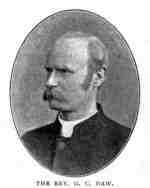 Although a Londoner born and bred I am
bound to confess that I was in painful ignorance of the
precise locality of Spital Square until I had occasion to
pay a visit to the Vicar of St. Mary’s, the Rev. G.
C. Daw. It is, therefore, not improbable that many of my
readers may be in a similar position, and it will be well
to state at once where it is and who are the people who
dwell there.
Although a Londoner born and bred I am
bound to confess that I was in painful ignorance of the
precise locality of Spital Square until I had occasion to
pay a visit to the Vicar of St. Mary’s, the Rev. G.
C. Daw. It is, therefore, not improbable that many of my
readers may be in a similar position, and it will be well
to state at once where it is and who are the people who
dwell there.
Spital Square itself, as the street is
called, is a turning out of Bishopsgate Street, and
almost within sight, on the opposite side of the way, of
the Liverpool Street Station extension, the terminus of
the G. E. R. But the parish of St. Mary, Spital Square
is, of course, of much wider extent. It includes two
ancient "liberties," viz., those of Norton
Folgate and of the Old Artillery Ground. These names call
up some very interesting historical associations ; but,
as I ventured to remark to the good Vicar when I was
chatting with him in his study one evening at the close
of a long day’s work, history is at a discount in a
utilitarian age like the present, and it will be more to
our purpose if we try to picture the parish as it is.
"You have some fine houses," I observed to
the Vicar, "in Spital Square I thought yours was an
East-end parish."
"So it is," he responded; "you have
seen the best of it the way you came in, but it will not
be my fault if you don’t see some of the worst of it
as you go out. Yet even in Spital Square the houses are
not tenanted as they once were. For the most part they
are now let out in tenements, whereas a generation or so
ago they were all occupied by good families, and one of
them was a favourite resort of an English
Sovereign."
"But that was before the days of
piano-organs," I interposed, with a sly reference to
one of those nuisances which I had noticed in full
operation as I passed along, with a dozen or so boys and
girls dancing round it.
" It was," the Vicar rejoined ; "but
you must not speak disparagingly of our only aristocratic
quarter. As I said, we have a history, and we are proud
of it. Do you not know that this parish was the home of
the silk-weaving industry, and some of the best
Spitalfields work was turned out from the looms
here?"
"I do not doubt it," I replied. "But
that must have been long ago."
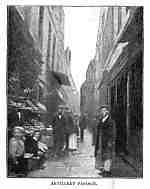 "Well, yes,
it was," the Vicar sighed; " we have nothing of
the sort here now. The weavers are all gone, and with
them the old glory of the place has departed. We have one
or two silk factories in the parish, but they are quite
modern ; and factory life at the East-end of London, even
under the best conditions, is not what we should like it
to be. You asked me what class our people belong to. We
have a good number of factory hands, and of respectable
artisans, but we have still more of the lower classes,
such as market porters, dock labourers, costermongers,
and the like. Our best people dwell in the Norton Folgate
part of the parish; but even there we have a few courts.
The Old Artillery Ground, however, is now quite a poor
district. The streets are small, and the houses in them
are nearly all let out in single rooms, while the courts
show a still lower order of things. Single rooms are a
special feature of this part, and frequently we find a
whole family huddled together in one room, the rent of
which ranges from 2s. 6l. to 3s.
6d. a week."
"Well, yes,
it was," the Vicar sighed; " we have nothing of
the sort here now. The weavers are all gone, and with
them the old glory of the place has departed. We have one
or two silk factories in the parish, but they are quite
modern ; and factory life at the East-end of London, even
under the best conditions, is not what we should like it
to be. You asked me what class our people belong to. We
have a good number of factory hands, and of respectable
artisans, but we have still more of the lower classes,
such as market porters, dock labourers, costermongers,
and the like. Our best people dwell in the Norton Folgate
part of the parish; but even there we have a few courts.
The Old Artillery Ground, however, is now quite a poor
district. The streets are small, and the houses in them
are nearly all let out in single rooms, while the courts
show a still lower order of things. Single rooms are a
special feature of this part, and frequently we find a
whole family huddled together in one room, the rent of
which ranges from 2s. 6l. to 3s.
6d. a week."
"This must represent a very sad state of
things," I said.
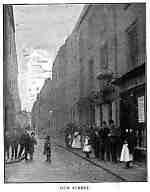 "Yes it
does," the Vicar sorrowfully replied ;
"but," he immediately added hopefully,
"our people are respectable, and there is very
little immorality. Speaking generally, family life is
held sacred here just as anywhere else. Our people are
poor - some of them very poor - but our work amongst them
is full of encouragement. If I were asked to describe the
position here, I should at once say it was a decidedly
hopeful parish."
"Yes it
does," the Vicar sorrowfully replied ;
"but," he immediately added hopefully,
"our people are respectable, and there is very
little immorality. Speaking generally, family life is
held sacred here just as anywhere else. Our people are
poor - some of them very poor - but our work amongst them
is full of encouragement. If I were asked to describe the
position here, I should at once say it was a decidedly
hopeful parish."
"You are not a stranger to East-end work?" I
asked.
"Oh, no," Mr. Daw replied. "As a layman
it was my privilege to work as a voluntary helper under
the present Bishop of Bedford, Dr. Billing, when he was
Rector of Christ Church, Spitalfields. Then in 1891 I was
ordained, and my first and only curacy was with the Rev.
E. A. B. Sanders, at Whitechapel Parish Church. I think,
then, that I may claim to know something of the East-end,
and I say that the work here is distinctly hopeful and
encouraging. Of course our parish is smaller than either
Spitalfields or Whitechapel. But we have 5,000 people,
and many of these are Jews."
"Are you making any special efforts to seek these
sons of Abraham?"
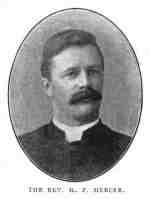 "Not at present; but I
have plans in my mind which I hope may soon take shape.
My work as Vice-Principal of the London Jews' Society
College at Palestine Place - a post I held for ten years
- has given me a keen interest in the welfare of the
Jewish people, and it will be a great joy to me if I am
permitted to bring some of my Hebrew parishioners to a
knowledge of the Lord Jesus as the true Messiah. But
special work of this kind requires time for its
development, and as I have been here but little more than
eighteen months I have had to spend much of the time in
building up parochial machinery and organising the
general work of the parish. My predecessor was a most
devoted and saintly man, but he was left here too long,
and with the growth of years his earlier energies
naturally fell off. My desire has been to get hold of
young people ; I don't mean children only, but young men
and young women, and I am much cheered by the results
that have attended our efforts. I say 'our' because it
would be quite impossible for any man single-handed to
make an impression on this parish. Thanks to the C.P.A.S.
this parish has enjoyed a grant for some years, and I
have been able to have the services of a curate whose
work here has been invaluable. I regret to say, however,
that the clergyman I refer to, the Rev. H. F. Mercer, has
just broken down in health, and I fear that the doctor
will not allow him to return to East London work. But the
point I want to make is this that the services of a
curate in this parish are essential, and that without the
help of the C.P.A.S. it would be impossible for that need
to be supplied. I must, however, repeat that Mr. Mercer
has been a most diligent and active worker. His open-air
services in the summer were most successful, and I have
reason to believe that they were greatly blessed to many.
Then his Bible Class for young men has been a power in
the neighbourhood. He also took a deep interest in
temperance work, and the Band of Hope has increased quite
four-fold since he took it in hand. Another special
department of his work has been the Church Lads' Brigade.
He managed to get hold of some of the roughest lads of
the parish. I am much disappointed that his health does
not seem strong enough to bear the strain of an East-End
parish. For strain it most certainly is. The visiting
alone is enough to try even a strong man. You can imagine
what it must be to spend a whole day going from room to
room in these narrow courts. But it must be done. I know
of no work more important than that of visiting the
people in their homes. It gives us an influence over them
that we cannot acquire in any other way. And it is most
hopeful work here. I find it far less difficult than I
did in Whitechapel. I can get into every room without the
least hindrance, and I have never once been
refused."
"Not at present; but I
have plans in my mind which I hope may soon take shape.
My work as Vice-Principal of the London Jews' Society
College at Palestine Place - a post I held for ten years
- has given me a keen interest in the welfare of the
Jewish people, and it will be a great joy to me if I am
permitted to bring some of my Hebrew parishioners to a
knowledge of the Lord Jesus as the true Messiah. But
special work of this kind requires time for its
development, and as I have been here but little more than
eighteen months I have had to spend much of the time in
building up parochial machinery and organising the
general work of the parish. My predecessor was a most
devoted and saintly man, but he was left here too long,
and with the growth of years his earlier energies
naturally fell off. My desire has been to get hold of
young people ; I don't mean children only, but young men
and young women, and I am much cheered by the results
that have attended our efforts. I say 'our' because it
would be quite impossible for any man single-handed to
make an impression on this parish. Thanks to the C.P.A.S.
this parish has enjoyed a grant for some years, and I
have been able to have the services of a curate whose
work here has been invaluable. I regret to say, however,
that the clergyman I refer to, the Rev. H. F. Mercer, has
just broken down in health, and I fear that the doctor
will not allow him to return to East London work. But the
point I want to make is this that the services of a
curate in this parish are essential, and that without the
help of the C.P.A.S. it would be impossible for that need
to be supplied. I must, however, repeat that Mr. Mercer
has been a most diligent and active worker. His open-air
services in the summer were most successful, and I have
reason to believe that they were greatly blessed to many.
Then his Bible Class for young men has been a power in
the neighbourhood. He also took a deep interest in
temperance work, and the Band of Hope has increased quite
four-fold since he took it in hand. Another special
department of his work has been the Church Lads' Brigade.
He managed to get hold of some of the roughest lads of
the parish. I am much disappointed that his health does
not seem strong enough to bear the strain of an East-End
parish. For strain it most certainly is. The visiting
alone is enough to try even a strong man. You can imagine
what it must be to spend a whole day going from room to
room in these narrow courts. But it must be done. I know
of no work more important than that of visiting the
people in their homes. It gives us an influence over them
that we cannot acquire in any other way. And it is most
hopeful work here. I find it far less difficult than I
did in Whitechapel. I can get into every room without the
least hindrance, and I have never once been
refused."
Mr. Daw then suggested that we should have a look
round the parish. It was getting late and I feared that
there would not be much to see. "Oh, we are late
people in these parts," he observed, and so it
proved.
The light was still burning in the school room (St.
Mary's is one of those parishes which, in spite of their
poverty, are gallantly maintaining their voluntary
schools), and we looked in. There, in one of the upper
rooms, was the Mothers' Meeting just coming to a close.
It seemed a strange time for such a gathering, but the
women there assembled could not come at an earlier hour,
for many of them had been at work all day.
A Bright Church.
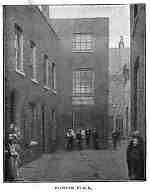 From the
schoolroom we passed into the church. It has lately been
renovated and one could not but be struck by its bright
and cheerful appearance. The walls and front of the
galleries have been decorated in art colours, and the
old-fashioned, high-back pews have given place to wide
open benches. The Vicar has done well to make his church
as bright and clean as possible, for there is too much
that is dismal and dirty in the immediate neighbourhood.
Asked about the congregations, he readily responded that
they were increasing every week. When he first went there
the church was but very sparsely attended, but the work
in the parish is having its effect, and there seems
reason to hope that before long the church will be
comfortably full, at least at the evening service. The
Vicar has secured grants from the S.P.C.K. and other
Societies, and by these means is able to put a Bible, a
Prayer-Book, and a Hymn-Book into the hands of every one
who comes into church. He uses the "Numbered
Prayer-Book," and as the service proceeds announces
the pages at which the different parts will be found -
the necessity for which is highly significant of the
class of people attending the church.
From the
schoolroom we passed into the church. It has lately been
renovated and one could not but be struck by its bright
and cheerful appearance. The walls and front of the
galleries have been decorated in art colours, and the
old-fashioned, high-back pews have given place to wide
open benches. The Vicar has done well to make his church
as bright and clean as possible, for there is too much
that is dismal and dirty in the immediate neighbourhood.
Asked about the congregations, he readily responded that
they were increasing every week. When he first went there
the church was but very sparsely attended, but the work
in the parish is having its effect, and there seems
reason to hope that before long the church will be
comfortably full, at least at the evening service. The
Vicar has secured grants from the S.P.C.K. and other
Societies, and by these means is able to put a Bible, a
Prayer-Book, and a Hymn-Book into the hands of every one
who comes into church. He uses the "Numbered
Prayer-Book," and as the service proceeds announces
the pages at which the different parts will be found -
the necessity for which is highly significant of the
class of people attending the church.
Before bidding me good-night the Vicar piloted me
through some of the smaller streets and courts of his
parish. I found that they corresponded in every respect
to his description of them - dark, dirty, and overcrowded
- and I could well appreciate the force of what he said
in reference to the trying character of a day's hard
visiting in this neighbourhood. But there is light in the
darkness, and one rejoices to know that the light is
spreading. It is in such a field as this that the
C.P.A.S. finds congenial soil, and its work there may, by
God's blessing, be the means of turning a wilderness into
a garden of the Lord.
by H. C. H.
Reprinted with permission of David Rich, Tower Hamlets History On Line.